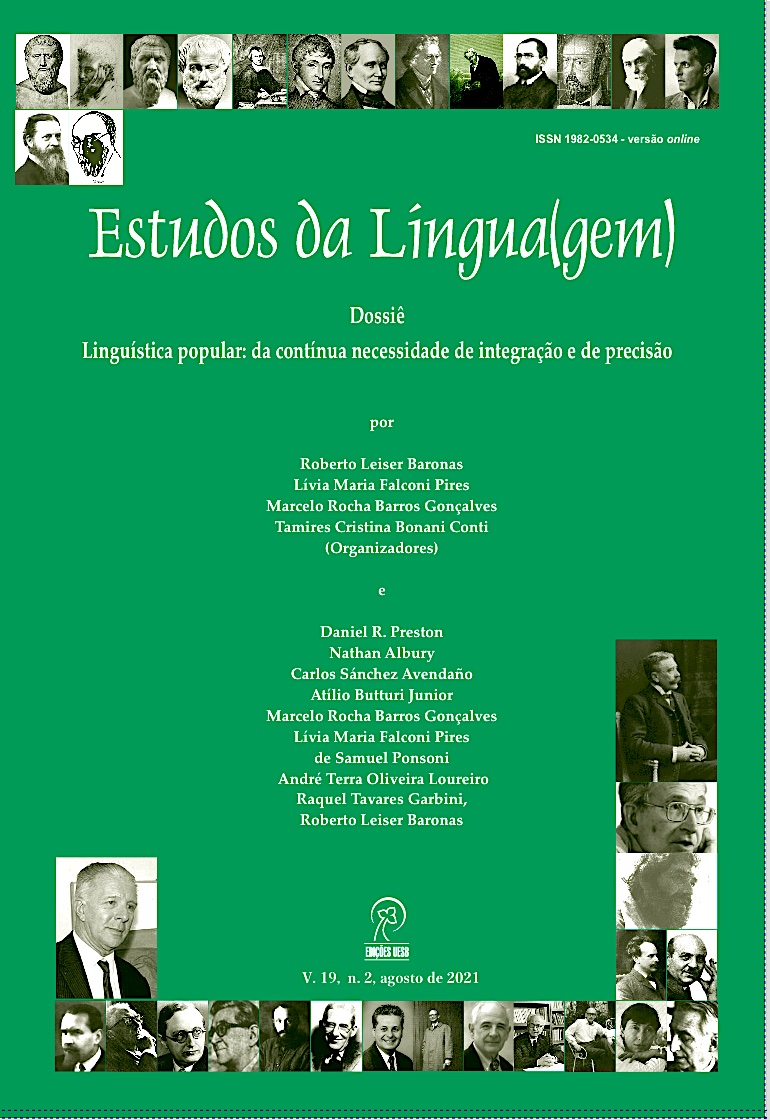Amadeu Amaral and the question of identity: A small homage to the centenary of O Dialeto Caipira
DOI:
https://doi.org/10.22481/el.v19i2.9946Keywords:
Portuguese spoken language in Brazil; Caipira dialect; History of Linguistic Ideas; Folk Linguistics; Linguistic Identity.Abstract
O Dialeto Caipira of Amadeu Amaral (1920), always referred to as seminal in the dialectological studies of Portuguese in Brazil, completes a century in this year 2020. In this paper, which intends to be more than a mere tribute to the author and his work, we will analyze, in a discursive perspective of the History of Linguistic Ideas (AUROUX, 2009; ORLANDI, 2001; MAINGENEAU, 2010) in Brazil and considering the outlines of Folk Linguistics (NIEDZIELSKI; PRESTON, 2003), the question of the caipira’s identity, pointing to linguistic marks that remained throughout this time. In a comparative table that intertwines two distinct times, we will analyze excerpts from the documentary Saberes do Vale (2018), verifying in the statements of the residents of Vale do Paraíba characteristics previously recorded by Amadeu Amaral. Starting from the definition of Caipira proposed in O Dialeto, a definition that presents the question of identity as a categorical property, we will try to verify the persistence of marks of subjectivity (and not only linguistic patterns) in the speech and living of these inhabitants of São Paulo.
Downloads
References
ACHARD-BAYLE, G.; CURE, A. Trivial Pursuit. Pratiques [en ligne], n. 139-140, p. 29-57 déc. 2008. Disponível em: http://journals.openedition.org/practices/1178. Acesso em: 17 ago. 2020. DOI: https://doi.org/10.4000/pratiques.1178.
ACHARD-BAYLE, G.; PAVEAU, M. Linguística popular - a linguística ‘fora do templo’: Definição, geografia e dimensões. Revista Fórum Linguístico, Florianópolis, v. 16, n. 4, p. 4257-4270, 2019.
AGUILERA, V. (org.) A Geolingüística no Brasil. Londrina, PR: Editora UEL, 1998.
AGUILERA, V. Reverberações de alguns aspectos linguísticos de O Dialeto Caipira em trabalhos geolinguísticos atuais. Apresentação por ocasião da homenagem a Amadeu Amaral na Live da EDUFSCar, promovida pela Editora da UFSCar e o Grupo de Pesquisa LEEDIM/CNPq. São Carlos, SP, 30/07/2020.
ALTMAN, C. Zeitgeist. Revista Confluência, Rio de Janeiro, n. 55, p. 164-182, 2018.
ALTMAN, C. 100 anos de O Dialeto Caipira. Apresentação por ocasião da homenagem a Amadeu Amaral na Live da EDUFSCar, promovida pela Editora da UFSCar e o Grupo de Pesquisa LEEDIM/CNPq. São Carlos, SP, 30/07/2020.
AMARAL, A. O Dialeto Caipira. São Paulo: Casa editora “O Livro”, 1920.
AMARAL, Amadeu. O dialeto caipira: gramática, vocabulário. 3ª. ed. Prefácio de Paulo Duarte. São Paulo: Hucitec em co-edição com a Secretaria de Cultura, Ciência e Tecnologia do Estado de São Paulo, 1976.
AMARAL, A. O Dialeto Caipira. São Paulo: Parábola. 2020.
ARAÚJO, A. A. DE. A redução das proparoxítonas a partir dos dados do projeto atlas linguístico do Brasil. Revista (Con)Textos Linguísticos, Vitória, v. 6, n. 7, p. 7-19, 2012.
ARAÚJO, A. A. DE.; LOPES, G. H. V. A síncope das proparoxítonas no atlas linguístico do Pará: uma fotografia variacionista. Revista (Con)Textos Linguísticos, Vitória, v. 8, n. 10, p. 24-29, 2010.
AUROUX, S. A Revolução Tecnológica da Gramatização. Campinas, SP: Editora da Unicamp. 2009.
BARONAS, R. L.; COX, M. Linguística popular/folk linguistics e linguística científica: Em vez do versus, propomos a integração. Revista Fórum Linguístico, Florianópolis, SC, v. 16, n. 4, 2019.
BRANDÃO, S. F. A Geografia Linguística no Brasil. São Paulo, SP: Ática, 1991.
CARDOSO, S. A. M. A Dialetologia no Brasil: Perspectivas. Delta, vol.15. São Paulo, 1999. DOI: https://doi.org/10.1590/S0102-44501999000300010.
CARDOSO, S. A. M. Atlas linguístico do Brasil: volume 1. Londrina: Eduel, 2014.
CASTRO, V. Revisitando Amadeu Amaral. Estudos Linguísticos XXXV, Revista do GEL, São Paulo, p.1937-1944, 2006.
CESCHIN, O. H. L. O Dialeto Caipira. Revista Língua & Litertura (USP), São Paulo, vol. 25, p. 41-80. 1999.
COLLINOT, A.; MAZIÈRE, F. Un prêt à parler: le dictionnaire. Paris: Presses Universitaries de France, 1997.
FERREIRA, C.; CARDOSO, S. A. A Dialetologia no Brasil. São Paulo, SP: Contexto, 1994.
GONÇALVES, M. R. B. Teorias linguísticas da espacialidade: uma agenda dialetológica na gramatização do português do Brasil. Tese de Doutorado. Programa de Pós-Graduação em Linguística, Instituto de Estudos da Linguagem (IEL), UNICAMP, Campinas, SP, 2012.
GONÇALVES, M. R. B. Espacialidade e gramatização: as cenas de definição em amaral e nascentes. Anais do SIELIPOP, São Carlos, SP, 2020
GONÇALVES, M. R. B.; BARONAS, R.L.; CONTI, T. Linguística popular/Folk Linguistics: saberes linguísticos de meia tigela? Campo Grande, MS: Editora da UFMS, 2020.
MAINGUENEAU, D. Doze conceitos em análise do discurso. Organização Sírio Possenti, Maria Cecília Perez de Sousa-e-Silva; tradução Adail Sobral...[et al.]. São Paulo: Parábola editora, 2010.
MAZIÈRE, F. A análise do discurso. São Paulo: Parábola Editorial, 2007.
MOITA LOPES, L. (org.) Por uma linguística aplicada indisciplinar. São Paulo: Parábola editorial, 2006.
NIEDZIELSKI, N. A.; PRESTON, D. R. Folk Linguistics. Mouton de Gruyter, New York, 2003.
ORLANDI, E. P. Lexicografia discursiva. Alfa, São Paulo, v. 44, p. 97-114, 2000.
ORLANDI, E. P. (org.) História das Ideias Linguísticas: construção do saber metalinguístico e constituição da língua nacional. Campinas, SP: Pontes; Cáceres, MT: Unemat Editora, 2001.
PAVEAU, M. Não linguistas fazem linguística? Uma abordagem antieliminativa das ideias populares. Policromias. Rio de Janeiro, ano. III, p. 21-45, dez., 2018.
PERES, E. P. De “vossa mercê” a “cê”: os processos de uma mudança em curso. Revista (Con)Textos Linguísticos, Vitória, v. 1, n. 1, p. 155-168, 2007.
PINTO, Edith Pimentel. O Português do Brasil – Vol. 1 e 2. São Paulo, SP: Edusp, 1978.
PRESTON, D. Methods in (applied) folk linguistics. AILA Review, v. 24, p. 15-39. John Benjamins Publishing Company, 2011.
SILVA, M. A nossa gramática: algumas reflexões teóricas acerca da constituição da identidade gramatical brasileira. Revista (Con)Textos Linguísticos, Vitória, v. 4, n. 4, p. 99-110, 2010.
Downloads
Published
How to Cite
Issue
Section
License

This work is licensed under a Creative Commons Attribution 4.0 International License.

Estudos da Língua(gem) is licensed under a Creative Commons Attribution 4.0 International License.
Authors who publish in the journal Estudos da Língua (gem) agree with the following terms:
The journal Estudos de Língua(gem) maintains the copyrights of the contributions published. These rights include the publication of the contribution and make its content available for free through the portal.







